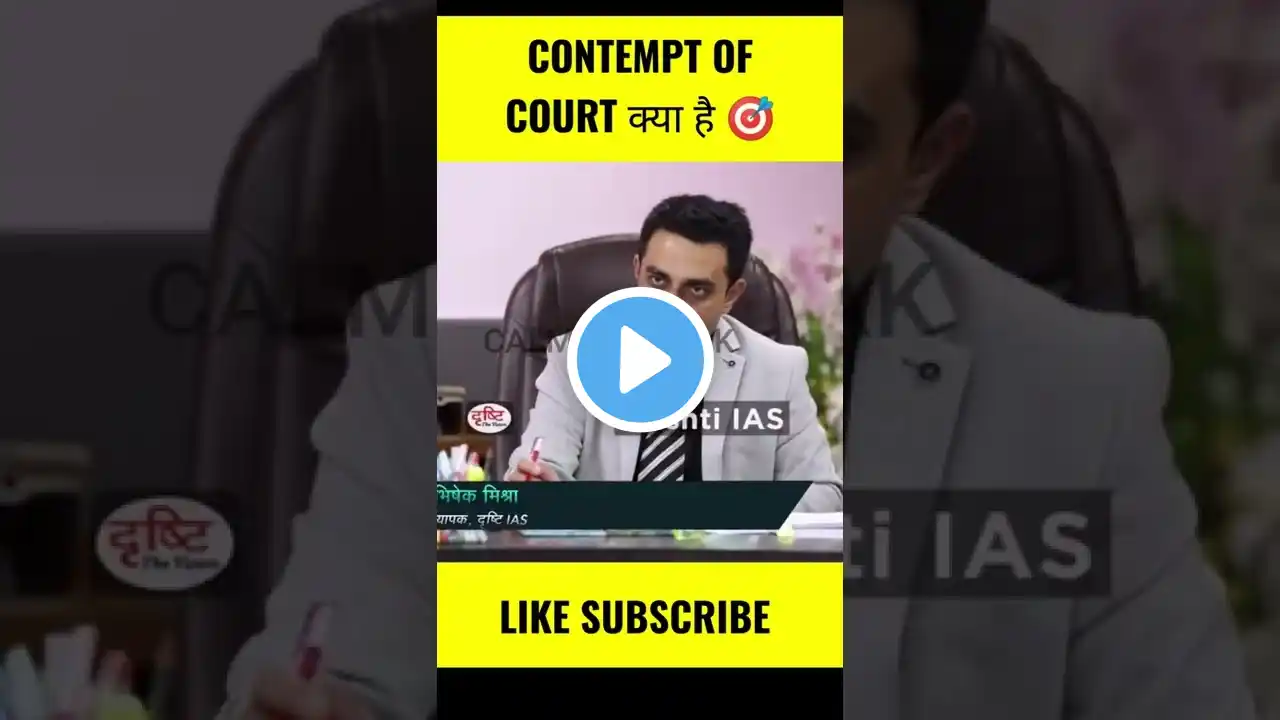
क्या है न्यायालय की अवमानना ? | Contempt of Court UPSC | Issues | EG Classes for IAS
Contempt of Court India In India contempt of court is of two types: Civil contempt Under Section 2(b) of the Contempt of Courts Act of 1971, civil contempt has been defined as wilful disobedience to any judgment, decree, direction, order, writ or other process of a court or wilful breach of an undertaking given to a court. Criminal contempt Under Section 2(c) of the Contempt of Courts Act of 1971, criminal contempt has been defined as the publication (whether by words, spoken or written, or by signs, or by visible representation, or otherwise) of any matter or the doing of any other act whatsoever which: Scandalises or tends to scandalise, or lowers or tends to lower the authority of, any court, or Prejudices, or interferes or tends to interfere with the due course of any judicial proceeding, or Interferes or tends to interfere with, or obstructs or tends to obstruct, the administration of justice in any other manner. Punishment Six months jail, or fine up to ₹2000, or both. History and Legislation The offence of contempt of courts was established in common law, and can also be traced to colonial legislation, with the earliest recorded penalties contained in the Regulating Act of 1773, which stated that the newly formed Mayor's Court of Calcutta would have the same powers as a court of the English King's Bench to punish persons for contempt. The Contempt of Courts Act 1926 was enacted to resolve a conflict of opinions between High Courts in India on whether they had the power to penalise offences of contempt committed against other, subordinate courts that fell under their jurisdiction. The Constitution of India, enacted in 1950, specifically established the Supreme Court of India as well as High Courts in the states of India as courts of record with the power to punish for acts of contempt. . In 1961, a committee headed by H.N. Sanyal, an Additional Solicitor General for the Government of India, was appointed to examine the application of contempt laws in India. The Sanyal Committee recommended that contempt proceedings should be initiated not by the courts themselves, but on the recommendation of a law officer of the government. Articles in Constitution Contempt of Court The Court relied on two constitutional provisions to derive contempt power. First, Article 129 of the Constitution of India, 1950 which makes the Supreme Court ‘a court of record’ and confers power to punish for contempt of itself. Second, Article 142 which allows the Court to provide punishment for contempt, subject to any other law. Contempt of Court Act Amendment 2006 Substitution of new section for section 13 In the Contempt of Courts Act, 1971 (70 of 1971), for section 13, the following section shall be substituted, namely:- "13. Contempts not punishable in certain cases.-Notwithstanding anything contained in any law for the time being in force,- (a) no court shall impose a sentence under this Act for a contempt of court unless it is satisfied that the contempt is of such a nature that it substantially interferes, or tends substantially to interfere with the due course of justice; (b) the court may permit, in any proceeding for contempt of court, justification by truth as a valid defence if it is satisfied that it is in public interest and the request for invoking the said defence is bona fide.''. 274th Law Commission Report The Law Commission of India in its 274th report to the Ministry of Law and Justice has suggested that it is not necessary to make any amendment, to the Contempt of Court Act, 1971, after a reference from the Government confined only to Section 2(c) of the Act 1971. 0:00 Introduction 1:41 Contempt Of Court Act 2:39 History 3:32 Articles in Constitution 4:31 Amendments 5:14 Social Media 6:22 274th Law Commission Report #EGClasses #EGClassesForIas #Issues #ContemptOfCourt #न्यायालयकीअवमानना #274thLawCommissionReport #ContemptofCourtActAmendment2006 EG Classes India's First IAS (UPSC) institute with Portability facility. We provide you written agreement of returning your fees within 4 months, as per this if you find any institute better than us, you can take back your fees and take admission in that institute. Follow Us On- Website: http://egclasses.com App: https://play.google.com/store/apps/de... YouTube: / expertguidanceclasses Facebook: / egclasseswithmanishsingh EG Classes Head Office- B7/8, Bhandari House, Mukherjee Nagar, Behind UCO Bank, Delhi-110009 For Inquiry- 011-42632053, 8586816870 Our Center- Mukherjee Nagar (Delhi), Dwarka (Delhi) Our Test Center- Mukherjee Nagar (Delhi), Dwarka (Delhi)

















